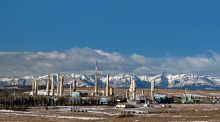
Canada’s oil industry is expected to dive into the red this year, but begin crawling back to profitability in 2016 as cost-cutting efforts pay off, according to a Conference Board report published amid a flurry of discouraging news in the oilpatch.
The Ottawa-based economic think-tank is predicting the oil extraction industry will post a $2.1-billion pre-tax loss in 2015, compared with profits of $6 billion last year.
Revenues are expected to fall by 22% this year, but rebound at an annual average rate of 14% growth between 2016 and 2019.
“While Canadian oil companies have acted swiftly, delaying capital investments, cutting expenses and reducing employment levels, profitability has plummeted,” said the Conference Board’s Michael Burt.
“However, these cost-cutting efforts should begin to bear fruit next year as the industry is expected to slowly return to profitability, even as oil prices remain low by recent standards.”
U.S. benchmark crude oil prices have spent much of 2015 languishing below the US$50-a-barrel mark — dropping below US$44 a barrel in recent days, around 60% lower than its 2014 high.
The Conference Board outlook comes a day after the NDP government of resource-reliant Alberta delivered its first budget — with a $6.1-billion deficit and a plan to borrow money to cover day-to-day programs.
—The realities of a resource-concentrated economy knocked down by weak oil prices will thrust Alberta more heavily into the debt markets over the next few years to fund deficits and capital projects while still preserving government-funded programs and services as well as the Alberta Advantage,” CIBC economists wrote in a report Tuesday following the budget’s release.
The Alberta Advantage was a slogan during the tenure of the late premier Ralph Klein touting the province as a good place to do business.
Just as Albertans were chewing over the latest budget numbers, European energy giant Royal Dutch Shell announced its Carmon Creek oilsands project in northwestern Alberta would be scrapped and it would take a $2-billion charge against its third-quarter earnings as a result. Shell cited a lack of pipeline access to global markets as one reason why Carmon Creek no longer ranks among its other projects.
On Wednesday, Oklahoma-based Devon Energy said it cut 15% of its Canadian workforce — about 200 positions — as spending is expected to remain “lower than historic lows for the foreseeable future,” said spokeswoman Nadine Barber.
Meanwhile, oilsands producer MEG Energy posted a quarterly net loss of $427.5 million, widening from a net loss of $101.0 million in the same period last year.
Over the past year, the company has trimmed about 30% of its workforce, including employees and contractors.
On the bright side, MEG said it’s managed to knock its net operating costs down to $9.10 a barrel, compared with $10.31 last year.